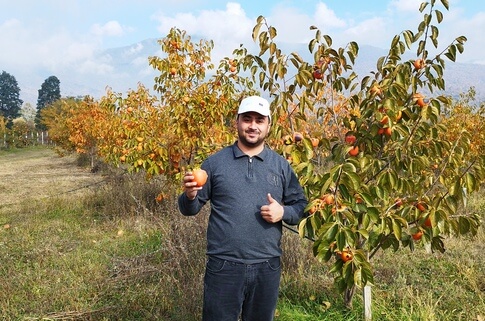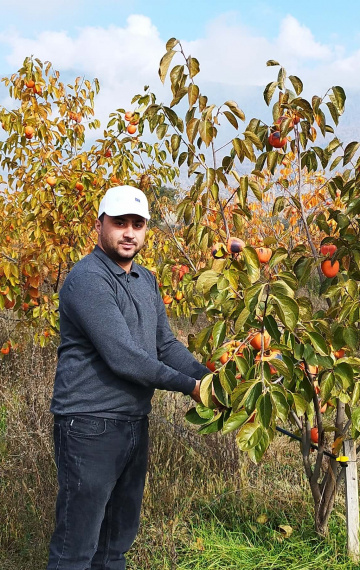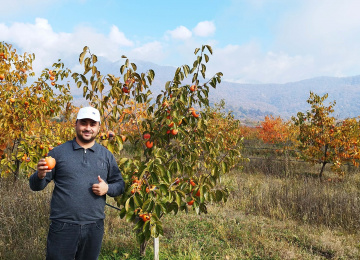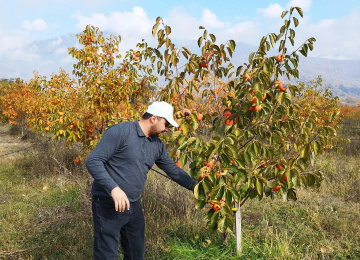
Business owners from Balaken, Azerbaijan, discover secrets to making a premium product – with help from the EU4Business
In business, growing or making a product is only half the battle.
Once you have your product, the next job is to sell it – and ideally not only in local markets, but in foreign ones as well. For that, you need know-how, and farmers from the countryside of Azerbaijan – persimmon producers from the country’s Balaken district – have discovered the secret to obtaining it: they joined an EU-funded project called “Development of Sustainable and Inclusive Agro-food Systems in the North-Western Region of Azerbaijan”.
Running a sustainable business
Persimmons are grown in Balaken region, located in the north-west of Azerbaijan, across an area of about 700 hectares. Here, persimmon production is the area of agriculture that has the highest export potential. Each year, several tons of this product are harvested in Balaken.
Product wastage is a problem, however. If the persimmons are not harvested at the right time and the temperature is too hot or too cold, they can start to rot on the trees. They also have to be sold quickly, or they will quickly spoil.
The solution found by many farmers was to dry their product to preserve it – an environmentally friendly way of preventing food waste that at the same time creates a tasty and healthy product.
During the drying process, fruits are kept under refrigeratation, which also extends their shelf life. Still, the process is complex and requires special equipment, which in turn requires money. That’s where the European Union came in.
The Balaken farmers were able to obtain funds and other necessary support through an EU-funded project called “Development of Sustainable and Inclusive Agro-food Systems in the North-Western Region of Azerbaijan.” The project is being implemented along with the United Nations Food and Agriculture Organization, or FAO. Relevant public and private service providers were also mobilized to support eco-friendly businesses in this particular region. Some of the farmers joined this initiative as a group, in cooperatives, including Sarkhan Hajiyev, the head of a dried-fruit enterprise.
"As part of the project, our needs were first identified by the EU and FAO,” Hajiyev says.
“Later we were given extensive training. They raised our business awareness. We participated in training on business planning, marketing, and budget preparation and management.”
Getting equipment
The entrepreneurs were also asked about their additional needs, and it soon became clear that equipment was also much in demand – it was simply a must in order to bring the best product to the market. So the project helped the farmers by funding the purchase of new equipment according to their needs. Some of the equipment has already been delivered and is operating.
Meanwhile, the dried fruit production cooperative is continuing to develop, and grow itself.
“We’ve managed to attract young participants (to the cooperative),” says Hajiyev. “They are farmers, persimmon producers. They grow persimmons in their gardens, and our goal is to bring them together and thus bring the best product to the market.”
Hajiyev says that after all the equipment is obtained and everything is working at full capacity, the cooperative will be able to produce better, more competitive products. But there are other benefits from working with the EU project, he notes.
“We not only got training and equipment, but also the opportunity to communicate. We’ve found a platform for meeting other farmers and producers. Sales was the toughest part of our business before we found support.”
More benefits
Another plus from the project for Hajiyev were the invitations that he got to fairs. For small processors, this represents a valuable opportunity to make lots of contacts and build up client networks. It’s a chance to communicate with sellers and establish business ties with them.
With the rapidly growing local market now under their belts, the dried persimmon producers face the task of exporting their products to foreign markets. To do this, they need to increase their output volumes and obtain certification. Persimmon in various forms, including in the form of chips, is a relatively new product on the market, so documents confirming that is it produced in accordance with hygienic standards are required.
For that, there’s no better advisor than the EU itself, via its project with the FAO. Having conquered the local market, the vast EU market, and then the market worldwide, is already in sight for the persimmon producers of Azerbaijan.



